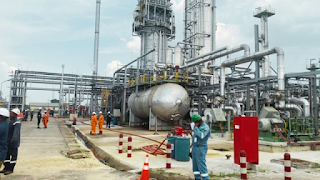A group led by prominent human rights lawyer Femi Falana (SAN) has reportedly uncovered that late President Umaru Musa Yar’Adua annulled the controversial sale of the Port Harcourt Refinery to a Dangote-led consortium after discovering the deal did not serve Nigeria’s best interests.
The Alliance on Surviving Covid-19 and Beyond (ASCAB) released a statement on Friday, revealing that former President Olusegun Obasanjo had allegedly sold 51% of the Port Harcourt Refinery to Bluestar Oil for $561 million.
Bluestar Oil, the group claimed, was a consortium made up of Dangote Oil, Zenon Oil, and Transcorp. A similar deal took place on May 28, 2007, when 51% of the Kaduna Refinery was sold to Bluestar Oil for $160 million.
“Bluestar Oil was a consortium of three domestic companies, including Dangote Oil, Zenon Oil, and Transcorp. Before the deal, President Obasanjo had acquired large shares in Transcorp through ‘blind trust’. Many interest groups in the country questioned the legal validity and moral propriety of the sales as they were consummated in the last days of the Obasanjo Administration,” the Falana-led group claimed, citing concerns over conflicts of interest.
The senior advocate further explained that under the Privatisation and Commercialisation Act, the Vice President serves as the chairman of the National Council on Privatisation (NCP), which manages the sale of national assets. However, Obasanjo reportedly bypassed then-Vice President Atiku Abubakar and took direct control of the privatisation process for key national assets.
On May 17, 2007, President Obasanjo sold 51% of the Port Harcourt Refinery to Bluestar Oil for $561 million, and on May 28, 2007, 51% of the Kaduna Refinery was sold to the same group for $160 million.
Both NUPENG and PENGASSAN, the two major trade unions in the oil industry, opposed the privatisation, citing conflicts of interest and improper procedures. The unions argued that the Port Harcourt refinery shares, purchased for $516 million, were actually worth $5 billion.
“These unions were convinced the nation had been shortchanged and went on a four-day strike in June 2007, which almost brought the Nigerian economy to a halt. The strike ended after the federal government promised a full investigation into the deals,” Falana noted.
Upon the completion of the investigation, then-President Yar’Adua reversed the privatisation of both the Port Harcourt and Kaduna refineries. Falana emphasized that the cancellation was not challenged in court, as it went against both the letter and the spirit of the Privatisation and Commercialisation Act.
“The Alliance on Surviving Covid and Beyond (ASCAB) calls on NUPENG and PENGASSAN to continue their historical struggle against the renewed push for the privatisation of Nigeria’s refineries. Those advocating for a privatisation deal that undermines national interest should be urged to set up their own refineries, like the Dangote Group,” the statement concluded.
In an exclusive interview with Channels Television, former President Obasanjo shared how the Nigerian National Petroleum Corporation (NNPC) rejected a $750 million offer from Aliko Dangote in 2007 to manage the Port Harcourt, Warri, and Kaduna refineries. Despite knowing that the NNPC could not manage the refineries effectively, Obasanjo said, the corporation turned down Dangote’s proposal.
Obasanjo explained, “After Shell declined my offer to manage the refineries due to corruption, poor maintenance, and low production output, Aliko Dangote formed a team and offered $750 million to participate in a Public–Private Partnership for managing the refineries. My successor (Yar’Adua) refunded their money. I spoke to him about it, and he said the NNPC wanted to manage the refineries. I said, but you know they cannot run it.”
(SAHARAREPORTERS)



.jpg)




















Post A Comment: